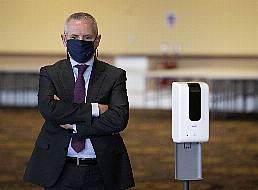Ireland's Covid-19 indicators are improving despite the rise of the Delta variant, according to the National Public Health Emergency Team (Nphet).
A further 373 cases of Covid-19 were confirmed on Thursday, as new data from the HSE revealed cases of the Delta variant rose by more than 50 in the space of a week.
The number of confirmed cases of the variant has increased to 180 in the Republic, up from 126 last week. However, it is understood that many of these cases are historical and are only being recorded now.
Nphet on Thursday urged those who are fully vaccinated to "resume normal life" and said indicators of the disease continue to improve nationally.
Professor Philip Nolan, chair of Nphet's modelling advisory group, said it was “reassuring” that in recent weeks the number of Delta variant cases was not increasing.
“So there’s some sense of stability in that important indicator,” he said, adding that many other indicators of the disease are improving nationally.
“In April/May incidence was stable at 400 to 500 cases a day — this has now reduced to a five-day average of 303. Hospital admissions have reduced from 103 to 57 in the past two weeks.
“If we can continue to weigh public health measures with vaccine uptake and continue to keep new variants, including Delta, at bay then the risk profile of Covid-19 in Ireland will alter for the better.”
Resume normal life
The country's chief medical officer, Dr Tony Holohan, urged those who are fully vaccinated to “resume normal life” as this part of the population experiences “near elimination” of the disease.
“We are now experiencing near elimination of Covid-19 in the vaccinated population. For the 50 to 65s who are in the process of receiving protection from full vaccination, incidence is dropping,” he said.
“Incidence is also reducing in most age groups, showing commendable compliance with public health measures as the vaccination programme is rolled out to more and more people.
“If you are fully vaccinated you can safely resume normal life — meeting other fully vaccinated people from up to two households indoors without masks or social distancing, and meeting unvaccinated people from one other household indoors and without masks,” Dr Holohan added.
“Those of us awaiting vaccination should continue to wash [and] sanitise hands regularly, manage contacts, avoid crowds, wear masks where appropriate and socialise outdoors.”
Incidence below 100
The HSE’s chief clinical officer Dr Colm Henry told an HSE briefing on Thursday that the 14-day incidence rate of the virus has now fallen below 100 cases per 100,000 people for the first time since late summer 2020.
“It’s a significant drop and one that reflects the overall trend, and the real impact of the vaccination programme,” he said.
Only two per cent of cases are now in people over the age of 65, Dr Henry said, with the vast majority now in people under the age of 45 — a predominantly unvaccinated cohort.
He added that the Delta variant is a “clear threat” to those who are unvaccinated or partially vaccinated.
The variant now accounts for five per cent of all cases in Ireland sequenced by the National Virus Reference Laboratory.
This compares to about 25 per cent in Northern Ireland and up to 90 per cent in England, where the variant has quickly become the dominant strain of the virus.
Second dose 'critical'
Dr Henry said completion of the second dose of vaccination is “critical” to ensure protection against the variant of the virus.
He cited a new study from the UK which indicates the variant is 64 per cent more transmissible than the Alpha variant, which was first identified in the UK and became dominant in Ireland around the new year.
Dr Henry said early evidence suggests the Delta variant may also pose an increased risk of hospitalisation, while there is also evidence of reduced vaccine effectiveness, particularly after just one dose.
However, the latest British research show the Pfizer vaccine is 96 per cent effective against hospitalisation with the variant after two doses, while the AstraZeneca vaccine is 92 per cent effective.
It comes as HSE chief executive Paul Reid said Ireland’s vaccine rollout is set to peak over the rest of June before reducing in July.
The administration of second doses of AstraZeneca will be completed by July 19th, health officials said.
—Additional reporting by Press Association.







